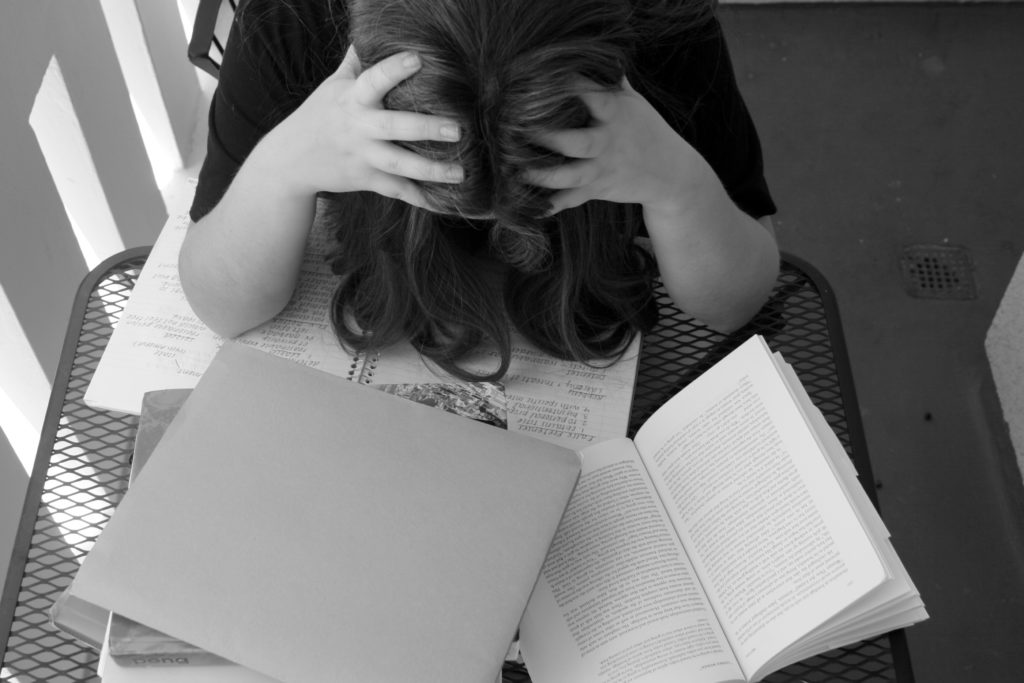I have to admit that when I first think of anxiety, I immediately associate it with stress. We throw the term around a lot by telling our friends “I’m so anxious” or “my anxiety is killing me”, but what do we really mean when we talk about having anxiety?
Anxiety goes beyond just being stressed. As one of the top mental health issues facing college students today, it’s time we understand what anxiety really is.
Yes, we can all have small moments of anxiety, whether that be during a job interview or even just driving down the freeway. Luckily for some of us, these anxious moments are over quickly and we can continue on with our day anxiety-free. However, for those who battle an anxiety disorder, these anxious feelings do not end after the minute or hour of an anxiety-triggering event is over, but can last for days, weeks, and even months.
Recently, a few of my friends shared their terrifying experiences of having a panic attack- all of which were due to school-related pressures. After hearing about how scared and powerless they felt during this time, I realized how undereducated I was in regards to anxiety.
After researching, I found that according to the Anxiety and Depression Association of America, 40 million U.S. adults suffer from an anxiety disorder and 75% of these adults experience their first anxiety episode before the age of 22.

Photo by Alexa Rojek
In the 2014 National College Health Assessment Survey, the survey estimates one in six college students have been diagnosed or treated for an anxiety disorder. With stats like these, we need to better understand anxiety and how it affects students’ day to day life.
Many people see anxiety as an excuse- that feeling anxious is not a valid reason for avoiding an assignment or social interaction. College is full of stressful moments. Since we all experience stressful situations weekly, it is often hard to understand that those stressful moments can dramatically affect someone with anxiety.
As Lisa Smith, director of BU’s Center for Anxiety & Related Disorders, says, “We know that stress can be a trigger of psychological conditions, especially in the context of unpredictability and uncontrollability. This seems to be inherent in the transition to college.”
For many college students, their freshman year brought along feelings of stress and anxiety at levels far more intense than anything they might have experienced in high school. Entering a new environment where “everyone seems on top of their game” or “has it all together” encourages self-judgement, stress, and uneasiness. Sometimes it’s hard to know when to ask for help.
When does your anxiety classify itself as a disorder? It’s important to understand that there is nothing wrong with feeling stressed, worried, or anxious. However, when you find yourself continuously anxious for days, weeks, and months, your healthy dose of passing worry could have developed into a disorder.
According to the National Institute of Mental Health, there are three different types of anxiety disorders: generalized anxiety disorder, panic disorder, and social anxiety disorder.
Generalized anxiety disorder is categorized as any excessive anxiety, or worry, for months. Individuals with panic disorder get these anxiety attacks all of the sudden. The attacks include a period of intense fear resulting in elevated heart rate, sweating, shaking, shortness of breath, and a feeling of impending doom. People with social anxiety disorder fear any social situation in which they may experience embarrassment, judgement, rejection, or offending someone. Those with social anxiety often isolate themselves, feel physically sick from a social situation, and extremely self-conscious when in front of others.
Anxiety disorders are common, especially among students. A whopping 23% of college students claim their anxiety affected their school performance. It’s important to understand these symptoms affect many people and to not pass it off as merely stress or an excuse.
College naturally creates stressful environments as we are put in situations where we must perform and deliver under pressure. It’s okay to be anxious and worried time to time.
However, when feelings of anxiety seem to consume your life, it’s important to seek professional help. Your mental health is just as important as your physical health. It’s important to recognize that it’s okay if you have an anxiety disorder— you are not alone and there are many resources available for you.


